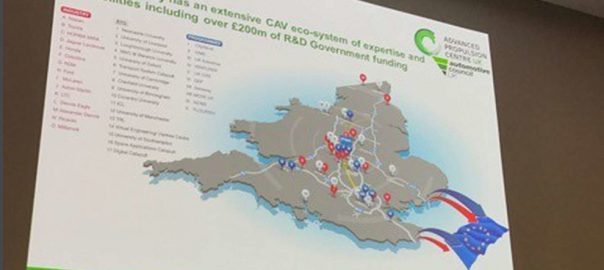With a new “Connected and Autonomous Vehicle Hub”, the UK government is streamlining its efforts to become the leading nation in driverless mobility. The administration’s bold vision will intensify international competition.
The day before petitioning for divorce from the EU, the UK government outlined its vision for a national autonomous vehicle testing infrastructure, offering to reconcile flag-waving with openness to inward investment.
The new Connected and Autonomous Vehicle Hub, or ‘CAV Hub’, was introduced at a launch event in London on 28 March at Loughborough University’s Olympic Park campus. It will oversee an ‘ecosystem’ for autonomous vehicle testing made up of permanent facilities, initially part-supported by public funds but intended to be economically viable in the long term.

The coordinating CAV Hub will be funded from a £100 million fund for new connected and autonomous vehicle testing infrastructure announced by the UK’s Chancellor of the Exchequer Philip Hammond last year. Jim Campbell, formerly of BMW, Land Rover and Worldwide Marketing Director of Bentley Motor Cars, introduced the new body at the launch, highlighting its mission to help enable the UK,
“to be the world number one for connected and autonomous vehicles.”
The CAV Hub is looking to build upon existing test centres and continue previous work on a (testing) code of practice, as well as in other regulatory frameworks such as insurance, cyber-security and data management. Campbell asserted that,
“government support is a big part of why people will want to come and work with our community in the UK – and it is getting noticed.”
With trials underway involving on-road real-life demonstrations in London by Nissan and by Volvo, plus research involving a nascent UK autonomous vehicle industry, including Jaguar Land Rover and several new entrants supported by earlier rounds of funding, Mr Campbell emphasised that non-UK operators are welcome to get involved so long as public money is used to support UK-based research.

A related announcement also made at the event was outline details of a funding competition to support the test facilities themselves, for which the UK government will offer up to £55 million to support three sites. These will be located in easy reach of Oxford, within the UK’s ‘automotive and technology heartland’.
Read more: 2025AD
